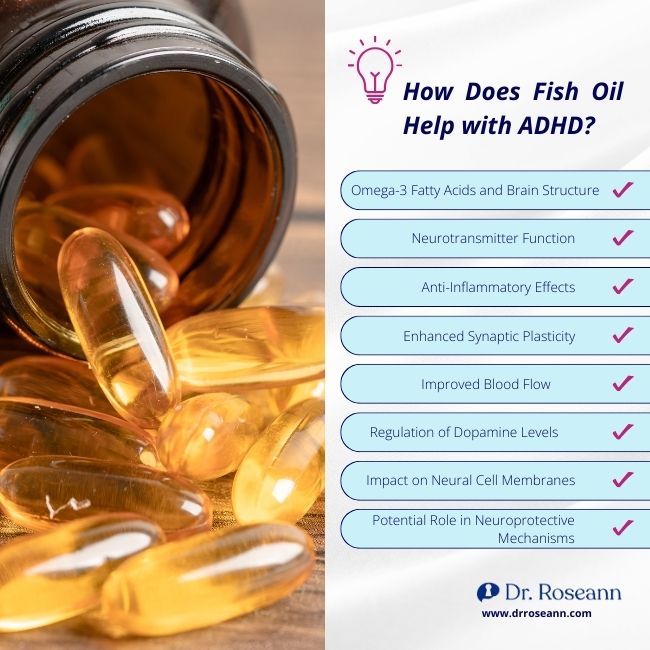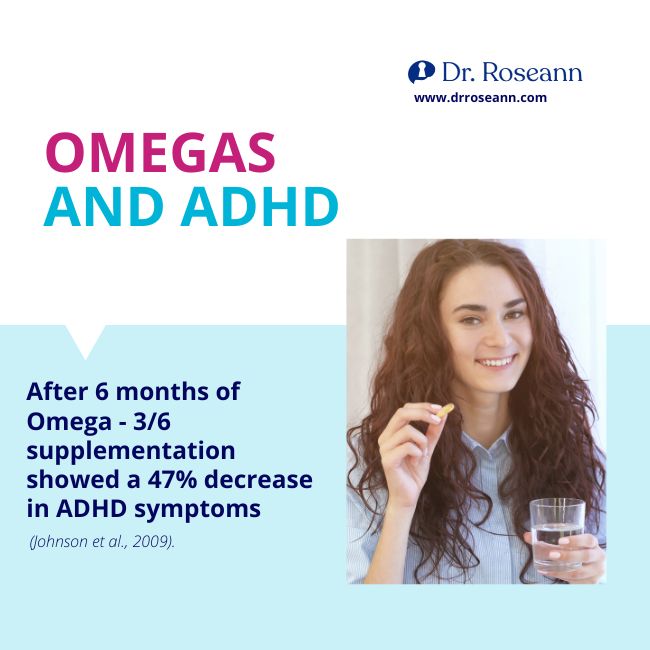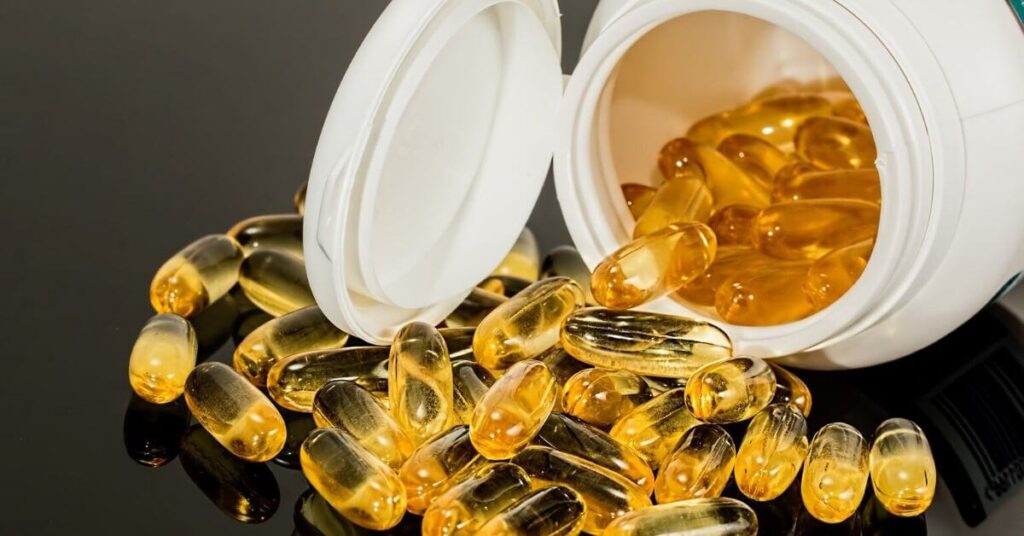Attention Deficit Hyperactivity Disorder (ADHD) poses challenges for individuals seeking attention, focus, and concentration. Recently, the link between ADHD and Omega 3 fatty acids has gained significant attention.
As an integrative ADHD mental health expert with decades of experience, I’m excited to share with you the intricate relationship between fish oil and ADHD. There is promising research that demonstrates with consistent usage, Omega supplementation can reduce symptoms.
Let’s delve into dosage considerations, other relevant research, and how Omega-3 fatty acids contribute to improved attention.
How Does Fish Oil Help with ADHD?

Understanding the mechanisms through which fish oil aids attention is vital for those considering it as a supplement. Here are the specific ways in which omega-3 fatty acids influence attention and cognitive fu
1. Omega-3 Fatty Acids and Brain Structure
The brain is composed of a significant amount of fat, and Omega-3 fatty acids, particularly EPA (eicosapentaenoic acid) and DHA (docosahexaenoic acid) are crucial components. These fatty acids are found in high concentrations in the brain and are essential for its structure and function.
2. Neurotransmitter Function
Omega-3 fatty acids play a role in the regulation of neurotransmitters, which are chemical messengers in the brain. Proper neurotransmitter function is vital for communication between nerve cells and is linked to attention, focus, and mood.
3. Anti-Inflammatory Effects
Omega-3 fatty acids possess anti-inflammatory properties. Inflammation in the brain has been associated with various cognitive issues, including attention deficits. By reducing inflammation, the right ADHD fish oil dose may contribute to better cognitive function.
4. Enhanced Synaptic Plasticity
Synaptic plasticity refers to the ability of synapses to change and adapt. Synapses refer to the connections between nerve cells. Omega-3 fatty acids are thought to enhance synaptic plasticity, which is essential for learning and memory processes associated with attention.
5. Improved Blood Flow
Omega-3 fatty acids have been shown to improve blood flow, including blood flow to the brain. Increased blood flow ensures that the brain receives an adequate supply of oxygen and nutrients, promoting optimal cognitive function, such as attention.
6. Regulation of Dopamine Levels
Dopamine is a neurotransmitter associated with attention and motivation. Omega-3 fatty acids may play a role in regulating dopamine levels, influencing the brain's reward and attention systems.
7. Impact on Neural Cell Membranes
Omega-3 fatty acids are incorporated into the cell membranes of neurons, affecting their fluidity and function. This can influence signal transmission between nerve cells and contribute to overall brain health.
8. Potential Role in Neuroprotective Mechanisms
Studies suggest that Omega-3 fatty acids may have neuroprotective effects, helping to safeguard neurons from damage (Calon & Cole, 2007). This protective role could contribute to maintaining optimal cognitive function, attention, and focus.
Choosing the Right ADHD Omega 3 Supplements
Can supplements help with ADHD? Yes! Choosing the right Omega-3 and vitamin supplements for ADD (Attention Deficit Disorder) and ADHD involves several key considerations to ensure optimal benefits and safety. First and foremost, look for a supplement that contains both EPA and DHA, the two primary types of Omega-3 fatty acids associated with health benefits.
Checking for third-party testing and certifications, such as those from organizations like IFOS, ensures the purity and quality of the supplement, free from contaminants like heavy metals. Additionally, considering sustainability and the source of Omega-3s is important for ethical and environmental reasons, as it promotes the use of fish oil from sustainable fisheries.
The form of the supplement, whether it's in capsules, liquid, or krill oil, should align with personal preferences and ease of consumption. It's vital to prioritize freshness, opting for supplements stored in dark, opaque containers to minimize oxidation and prevent the development of an unpleasant taste. Bioavailability is another factor to consider, with some forms, such as triglyceride or phospholipid-based Omega-3s, offering higher absorption rates.
Furthermore, check for allergens, especially if there are known sensitivities to fish or shellfish. Some supplements provide alternatives like algae-based Omega-3s for those with seafood allergies.
Also, Implementing fish oil into a daily routine requires practical considerations. As we unravel the ADHD and fish oil connection, it becomes evident that omega-3 fatty acids hold promise in supporting attention and managing hyperactivity.
Fish Oil and Omega 3 Dosage for ADHD
One crucial aspect of integrating fish oil into ADHD management is determining the appropriate dosage. Research on Omega 3 and attention deficit disorder suggests that a balanced intake of fatty acids is essential for optimal benefits (Bos et al., 2015). So, what are the recommended fish oil dosage for ADHD and the factors to consider when determining an effective regimen?
Before thinking about fish oil ADHD dosage, the first and most important consideration is the EPA and DHA content. Look for fish oil supplements with higher concentrations of EPA and DHA for ADD and ADHD. These omega-3 fatty acids are believed to be beneficial for cognitive and behavioral functions.
An ADHD Omega 3 dosage may vary based on the child's age. Generally, recommendations may range from 250 mg to 1,000 mg of combined EPA and DHA per day. Seek guidance from a pediatrician or healthcare provider to determine the right Omega-3 dosage for ADHD children. They can provide personalized advice based on the child's health history, dietary habits, and potential interactions with other medications.
Factors to Consider to Determine an Effective ADHD Fish Oil Regimen
Did you know that Omega-3 is also one of the best supplements for behavior problems? That’s why finding the right dosage of fish oil for ADD and ADHD is important. Here are some considerations when recommending fish oil dosages for children with ADHD and some factors to determine an effective regimen:
- Child's Weight: Dosages are often calculated based on body weight. Higher doses may be recommended for larger children.
- Severity of ADHD Symptoms: The severity of ADHD symptoms may influence the recommended dosage. Children with more pronounced symptoms may require higher amounts of Omega 3 for ADHD.
- Dietary Intake of Omega-3s: Consider the child's current diet. If their regular diet already includes significant amounts of fatty fish, such as salmon, mackerel, or sardines, the supplementation dosage might be adjusted accordingly.
- Form of Fish Oil: Fish oil supplements come in various forms, including liquid, capsules, and gummies. Choose a form that is suitable for the child's preferences and easy for them to consume consistently.
- Purity and Quality of the Supplement: Select a high-quality fish oil supplement that undergoes third-party testing for purity. This ensures that the product is free from contaminants, such as mercury, which can be a concern with certain fish.
- Consistency in Administration: Consistency is key. Administer the supplement at the same time each day to establish a routine. This helps ensure that the child receives a consistent intake of Omega-3 fatty acids.
- Monitoring and Adjustments: Regularly monitor the child's response to the supplement. If there are noticeable improvements or concerns, consult with the healthcare provider for potential dosage adjustments.
Research Findings on Fish Oils for Attention Deficit Disorder
Beyond fish oil for ADHD dosage, numerous studies have investigated the impact of Omega-3 fatty acids on hyperactivity and attention-related issues. Let’s highlight the key findings from various research studies to provide a comprehensive overview of the broader scientific landscape surrounding the use of fish oil in ADHD management.
A study by Chang et al. (2018) reviewed various literature to see if Omega-3 supplements could help with ADHD symptoms and cognitive functions. Results show the relationship between EPA/DHA and ADD/ADHD. Omega-3 helped improve their ADHD symptoms and cognitive abilities related to attention as they tend to have lower levels of specific Omega-3 fatty acids in their blood.

A separate study by Johnson et al. (2009) investigated Omegas and ADHD, particularly Omega-3 and Omega-6 The research involved a 3-month randomized trial with 75 children and adolescents aged 8–18 years using Omega-3/6 supplements, followed by 3 months of Omega-3/6 for all participants.
The ADHD Rating Scale—IV and Clinical Global Impression (CGI) scale were used as outcome measures. The results showed that the majority did not respond to omega 3/6 treatment. However, 26% of participants experienced more than a 25% reduction in ADHD symptoms and a drop in CGI scores to near-normal levels. After 6 months, 47% showed improvement. Responders were more likely to have the inattentive subtype of ADHD and additional neurodevelopmental disorders.
Overall, fish oil, especially omega-3 fatty acids like EPA and DHA, is a good thing for your child with ADHD. It all boils down to the crucial factors related to picking a fish oil supplement, the right dosage, and ensuring that it's pure and safe. Talk with your child's healthcare professional to know the best route to take and figure out what might work for your kiddo while keeping an eye on their progress.
Does fish oil help ADHD?
There is evidence suggesting that fish oil for ADHD kids helps, specifically omega-3 fatty acids. Regular intake shows potential improvements in attention, focus, and cognitive function.
Is fish oil for adults with ADHD also effective?
Research on omega 3 and adhd in adults suggests that fish oil has positive effects on ADHD symptoms, such as better cognitive function and attention. Fish oil also works with other vitamins for ADHD in adults.
What is the best Omega 3 supplement for ADHD?
When selecting the best omega-3 supplement for ADHD children, prioritize those with higher concentrations of both EPA and DHA, as these fatty acids are associated with potential benefits for ADHD symptoms.
What is the best fish oil for ADHD?
When choosing a fish oil supplement, prioritize those with high concentrations of EPA or DHA for ADHD. Opt for products that undergo third-party testing for purity, such as certifications from reputable organizations like IFOS, to ensure freedom from contaminants.
Can Omega 3 help with ADHD in younger children?
Some studies suggest a potential link between Omega-3 supplementation and improvements in ADHD symptoms in younger children. Omega-3 fatty acids are important for brain development, and deficiencies in these essential fatty acids have been associated with neurodevelopmental disorders.
Does fish oil help with ADD?
Omega-3 fatty acids, specifically EPA and DHA are essential components of cell membranes in the brain and play a role in neurological function in children with Attention Deficit Disorder. Deficiencies in these fatty acids have been linked to various cognitive and behavioral issues.
What vitamins help with ADD?
Certain vitamins good for ADHD can improve brain function and overall health. These natural vitamins for ADD and ADHD include B Vitamins, especially B6 and B12, and Vitamin D. They are often discussed concerning supporting cognitive function. Other natural ADD supplements may also help.
How much Omega 3 for ADHD?
When it comes to fish oil and adhd dosage, general recommendations often suggest a combined daily dosage of EPA (eicosapentaenoic acid) and DHA (docosahexaenoic acid) in the range of 500 to 1,000 milligrams for children and adolescents. For adults, dosages may range from 1,000 to 2,000 milligrams or more per day.
How do you compare EPA vs DHA for ADHD?
Research on EPA, DHA and ADHD suggests that EPA may have a more specific role in addressing hyperactivity and impulsivity, while DHA is crucial for overall brain development and cognitive function. Studies often use a combination of EPA and DHA, recognizing their synergistic effects.
How long does it take for Omega 3 to work?
The time it takes for omega-3 supplements to exhibit noticeable effects varies among individuals and is influenced by factors such as health status, the condition being addressed, and dosage. Some children may experience changes within a few weeks of consistent supplementation. Others may require several weeks to months before observing noticeable effects.
How long does it take for fish oil to work?
The time it takes for fish oil to show noticeable effects varies among individuals, with some experiencing changes within a few weeks, while others may take several weeks to months.
Can you combine fish oil with Adderall?
Combining Adderall and fish oil or any other medication should only be done under the supervision and guidance of a healthcare professional. Fish oil and Adderall may have effects on neurotransmitters and brain function, and their interaction could lead to unexpected outcomes or potential side effects.
What are other supplements for ADHD in adults and children?
Other supplements explored for potential benefits in adults with ADHD include iron, zinc, probiotics, and magnesium. The additional supplement for ADHD adults may include L-carnitine, ginkgo biloba, Rhodiola rosea, and phosphatidylserine.
What’s the best form of zinc for ADHD?
The common forms of zinc supplements include zinc sulfate, zinc gluconate, zinc picolinate, and zinc citrate. Each form of zinc has its absorption rate and bioavailability. Zinc picolinate and zinc citrate are often considered more easily absorbed by the body compared to zinc sulfate.
Citations
Bos, D. J., Oranje, B., Veerhoek, E. S., Van Diepen, R. M., Weusten, J. M., Demmelmair, H., Koletzko, B., de Sain-van der Velden, M. G., Eilander, A., Hoeksma, M., & Durston, S. (2015). Reduced Symptoms of Inattention after Dietary Omega-3 Fatty Acid Supplementation in Boys with and without Attention Deficit/Hyperactivity Disorder. Neuropsychopharmacology, 40(10), 2298–2306. https://doi.org/10.1038/npp.2015.73
Calon, F., & Cole, G. (2007). Neuroprotective action of omega-3 polyunsaturated fatty acids against neurodegenerative diseases: Evidence from animal studies. Prostaglandins, Leukotrienes and Essential Fatty Acids, 77(5-6), 287–293. https://doi.org/10.1016/j.plefa.2007.10.019
Chang, J. P.-C., Su, K.-P., Mondelli, V., & Pariante, C. M. (2018). Omega-3 Polyunsaturated Fatty Acids in Youths with Attention Deficit Hyperactivity Disorder: a Systematic Review and Meta-Analysis of Clinical Trials and Biological Studies. Neuropsychopharmacology, 43(3), 534–545. https://doi.org/10.1038/npp.2017.160
Johnson, M., Östlund, S., Fransson, G., Kadesjö, B., & Gillberg, C. (2009). Omega-3/Omega-6 Fatty Acids for Attention Deficit Hyperactivity Disorder. Journal of Attention Disorders, 12(5), 394–401. https://doi.org/10.1177/1087054708316261
Dr. Roseann is a mental health expert in ADHD who frequently is in the media:
- She Knows 11 Products Moms of Kids With ADHD Swear By to Maintain Order in the Chaos
- The Healthy 12 Silent Signs of Adult ADHD You Might Be Ignoring
- Seeme & Liz 12 Essential Parenting Tips For Kids with ADHD
- Evan H. Hirsch, MD – EnergyMD with Dr. Roseann Capanna-Hodge (Video) Topic: Is it Brain Fog or ADHD?
Always remember… “Calm Brain, Happy Family™”
Disclaimer: This article is not intended to give health advice and it is recommended to consult with a physician before beginning any new wellness regime. *The effectiveness of diagnosis and treatment vary by patient and condition. Dr. Roseann Capanna-Hodge, LLC does not guarantee certain results.
Are you looking for SOLUTIONS for your struggling child or teen?
Dr. Roseann and her team are all about science-backed solutions, so you are in the right place!
Take this quiz and find out!
Is it ADHD or something else?
Dr. Roseann is a Children’s Mental Health Expert and Licensed Therapist who has been featured in/on hundreds of media outlets including The Mel Robbins Show, CBS, NBC, PIX11 NYC, Today, FORBES, CNN, The New York Times, The Washington Post, Business Insider, Women’s Day, Healthline, CNET, Parade Magazine and PARENTS. FORBES called her, “A thought leader in children’s mental health.”

She coined the terms, “Re-entry panic syndrome” and “eco-anxiety” and is a frequent contributor to media on mental health.
Dr. Roseann Capanna-Hodge has three decades of experience in working with children, teens and their families with attention-deficit hyperactivity disorder (ADHD), autism, concussion, dyslexia and learning disability, anxiety, Obsessive Compulsive Disorder (OCD), depression and mood disorder, Lyme Disease, and PANS/PANDAS using science-backed natural mental health solutions such as supplements, magnesium, nutrition, QEEG Brain maps, neurofeedback, PEMF, psychotherapy and other non-medication approaches.
She is the author of three bestselling books, It’s Gonna Be OK!: Proven Ways to Improve Your Child's Mental Health, The Teletherapy Toolkit, and Brain Under Attack. Dr. Roseann is known for offering a message of hope through science-endorsed methods that promote a calm brain.
Her trademarked BrainBehaviorResetⓇ Program and It’s Gonna be OK!Ⓡ Podcast has been a cornerstone for thousands of parents facing mental health, behavioral or neurodevelopmental challenges.
She is the founder and director of The Global Institute of Children’s Mental Health, Neurotastic™Brain Formulas and Dr. Roseann Capanna-Hodge, LLC. Dr. Roseann is a Board Certified Neurofeedback (BCN) Practitioner, a Board Member of the Northeast Region Biofeedback Society (NRBS), Certified Integrative Mental Health Professional (CIMHP) and an Amen Clinic Certified Brain Health Coach. She is also a member of The International Lyme Disease and Associated Disease Society (ILADS), The American Psychological Association (APA), Anxiety and Depression Association of America (ADAA) National Association of School Psychologists (NASP), International OCD Foundation (IOCDF).
© Roseann-Capanna-Hodge, LLC 2024
Disclaimer: This article is not intended to give health advice and it is recommended to consult with a physician before beginning any new wellness regime. *The effectiveness of diagnosis and treatment vary by patient and condition. Dr. Roseann Capanna-Hodge, LLC does not guarantee certain results.










